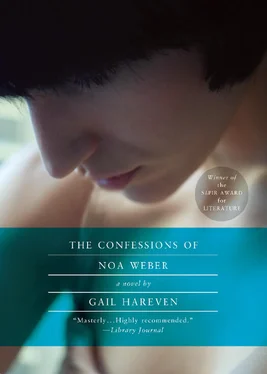Looking back it is clear to me that I put my daughter into a situation that could have been dangerous, and I don’t take any credit for the fact that we emerged unscathed.
HANDS OF MERCIFUL WOMEN
Hands of Merciful Women is the name of a painting I once saw in an art book; the painting itself did not remain in my memory, but the name stuck in my mind. Most of the actual good in my life came to me at the hands of women, and if I could choose whom to love with all my soul, I would choose a woman and not a man. With the passage of the years I have learned to love my mother and my daughter, and I love my girlfriends, but in my opinion I should love them differently, because even if I can’t do without the folly of “he-makes-me-come-alive” and “I-can’t-live-without-him,” the feeling of love should be directed towards those I can’t live without in reality. And in reality the man isn’t there, and the hands of merciful woman always appeared in time.
When I was still pregnant, towards Passover, it was my sister who appeared like an angel on a bicycle, accompanied by a tiny little friend who turned out to be her classmate. Perhaps she had been sent by my mother to put out feelers, I didn’t ask, but in any case Alek wasn’t home, and I seated the pair of them in the living room and put on a show for them. They sat close together on the mattress, like two little birds, looking around with birdlike curiosity at everything, and when I went into the kitchen to make them tea — there were no cookies in the house — I heard the tiny friend whisper: “If she only got married to get out of going to the army, how come she’s pregnant?” And my sister answering with a pride that brought sudden tears to my eyes: “That’s how it is when you’ve got a bohemian sister.”
Those were bad days, the days before Passover, days of Schubert symphonies, when nobody talked to Noa; Hagar lay high and pressed on my diaphragm, I only dragged myself out of bed when the little girls knocked on the door, and nevertheless in my capacity as the bohemian big sister I put on a Gershwin record for them, drew them out with amused superiority — what’s new at school and what’s new in the youth movement — and threw out anarchistic remarks about this and that. In the course of putting on this act of a free-spirited woman of mystery my mood somewhat improved, but Talush somehow saw through me, or maybe not, but in any case, for whatever reason, she turned up again the next day on her own behalf, and took out of her jeans bag two papayas and a giant pineapple that our father had brought back from Africa, and a few bars of chocolate from the airport, all of which she had swiped from our parents’ kitchen. “You probably have to eat a lot if you’re pregnant,” she said, and her face was bright pink, and her nostrils and upper lip trembled, as they do to this day when she’s excited.
On the third evening after my return from the hospital, I think it was the third evening, the downstairs neighbor Miriam Marie, who now that she no longer lives downstairs is regarded by Hagar and myself as a member of the family, and who up to then hardly impinged on the fringes of my consciousness, knocked on the door. She realized that a baby had been born, and came with a plate of cookies to congratulate me, and after seeing me she went downstairs again and came back with a little pot of chicken and rice which without asking she put on the stove to heat up.
Before this I had hardly exchanged more than a couple of sentences with her, in my eyes she was just one of the extras cast to play a bit part on the margins of my drama, but it quite soon became apparent to me that Miriam had taken in more than a little of the drama, and that her understanding of what was happening with me was closer to reality than anyone else’s. So close to reality that in the future, whenever Alek showed up, I was afraid that she would see him and despise me. So that when she moved to Maaleh Adumim on the outskirts of Jerusalem to be close to the grandchildren on the way, I felt relieved. And even though I missed, and still miss, the warmth of her closeness, I was relieved to be rid of her look.
Miriam Marie. If I was a real writer and a proper human being, I would have written her story and not mine, because whichever way you look at it she’s the true heroine and I’m the phony. When she came up the first time she was forty-four, only a little younger than my mother, but she looked years older. She hasn’t changed much since then, as if her appearance had been fixed at a certain age, before old age and after the stage at which femininity, consciously or unconsciously, is directed towards men. Today, too, when she dyes her hair with raven black henna, wears three-piece outfits of cheap gaudy velvet and “artistic” brooches pinned to her bosom, she gives the impression that she is only dressing up to broadcast her feeling of well-being to the world.
When I met her she had one son, called Avi, who was already studying for his master’s degree in education. When the boy was seven she had been abandoned by the husband—“the engineer” she sometimes calls him scornfully, though he really was an engineer — who ran away to France with a relation of hers. A little girl of sixteen from the immigrants transit camp in Talpiot. The main outlines of her story she told me that first evening, I think, holding Hagar securely while she bustled about the kitchen. “If I ever tell you the story of my life …,” she said. Or perhaps she didn’t tell me everything then, as I sat with her weak and dizzy in the kitchen, and my memory is filling in the details from later installments. How he abandoned her to her fate as an aguna , a woman whose husband’s whereabouts are unknown. How the rabbis over there searched for him, how it took them nine years to find him. And how she, with very little Hebrew, went to work, first as a cleaning lady, then taking a course to qualify as a kindergarten teacher’s assistant, which didn’t pay enough to care for the child, so that even with the steady kindergarten job she always took on extra work. Over the years I heard these stories again and again: how she managed to put food on the table, how she made sure that Avi went to school, and how in the end she moved to the center of town just so he would get into a good high school. “All his reports were ten out of ten, ten out of ten for everything. One day I’ll show you, you’ll see what they write about him there. But the principal didn’t want to let him into the gymnasium, just because he was from Nachlaot. Every day I went to the municipality and sat there to make them look me in the face, and in the end what do you think? They took him, they didn’t want to, but they did. Just because of my character, that I don’t give in.” What I remember clearly is that at some moment of that monologue I suddenly wanted a cigarette badly. I hadn’t smoked since the birth, and suddenly for some reason I was dying for a cigarette, so that although I knew I wouldn’t find one, I got up and began opening all the empty drawers in the house, one after the other. When I had despaired of the closet, with my hands still fumbling inside it, Miriam came and stood behind me, my daughter folded in her arms. “You shouldn’t be left alone,” she said. “It’s not normal. There are women that get a psychological depression from it. Believe me, I know what I’m talking about.” Then she put her hand in her pocket and offered me a packet of Europa cigarettes. “Promise me you won’t smoke next to the baby.”
In time I began to respond to this woman with the admiration she demanded and richly deserved, but on that first evening I didn’t have the strength to utter a word, as if the road from their origins somewhere inside me to my mouth was too long for me to lead them along it. Nevertheless I was grateful that somebody was talking to me.
Читать дальше












